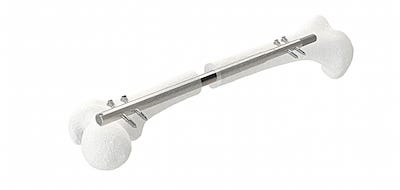As part of its commitment to support startup companies with innovative technologies that solve problems in healthcare, among other self-identified megatrends, Evonik Industries (Essen, Germany) has invested in Synoste Oy (Helsinki) via its venture capital arm. The investment gives Evonik a minority share in the medtech startup, which has developed an implant for the minimally invasive treatment to lengthen a leg that is shorter than the other.
January 21, 2016
As part of its commitment to support startup companies with innovative technologies that solve problems in healthcare, among other self-identified megatrends, Evonik Industries (Essen, Germany) has invested in Synoste Oy (Helsinki) via its venture capital arm. The investment gives Evonik a minority share in the medtech startup, which has developed an implant for the minimally invasive treatment to lengthen a leg that is shorter than the other. The investment was made as part of a series A round, together with High-Tech Gründerfonds, a public-private German partnership that provides seed financing; two Finnish venture capital funds Finnvera and Lifeline Ventures; as well as Finnish business angels. Total financing is in the single-digit million euro range, according to Evonik.
 Founded in 2012, Synoste is a spin-off from Aalto University in Espoo (Finland). Together with Orton, a Helsinki-based hospital specialized in orthopedics, Synoste has developed a high-tech implant made from Evonik's Vestakeep PEEK polymer to treat leg-length discrepancy, which can lead to chronic back pain and osteoarthritis. The technology gently lengthens the bone over a period of several months, reportedly reducing pain and lowering risk for patients compared with conventional methods.
Founded in 2012, Synoste is a spin-off from Aalto University in Espoo (Finland). Together with Orton, a Helsinki-based hospital specialized in orthopedics, Synoste has developed a high-tech implant made from Evonik's Vestakeep PEEK polymer to treat leg-length discrepancy, which can lead to chronic back pain and osteoarthritis. The technology gently lengthens the bone over a period of several months, reportedly reducing pain and lowering risk for patients compared with conventional methods.
Approximately 30,000 people worldwide receive leg-length discrepancy treatments annually, according to Evonik. The standard treatment method involves the use of an external fixator, a device made of steel that is attached to the bone and the outside of the leg. This method poses a risk of infection and is painful and uncomfortable for the patient.
The implant developed by Synoste is similar to an intramedullary nail and is attached to the bone after the bone has been cut. During the treatment period, which lasts for several months, the implant is electromechanically extended in increments of 0.5 millimeters, allowing fresh bone substance to steadily form between the two halves of the bone. Using this method, it is possible to increase bone length by several centimeters, according to the companies.
The PEEK-based implant features high mechanical stability and lets patients bear their full weight on the leg at an early stage in the treatment process. Furthermore, it significantly reduces the risk of infection compared to a fixator, and shortens hospitalization time.
"By investing in Synoste we hope to open up a new, extremely innovative application for Vestakeep PEEK and enhance our business and expertise in the field of medical technology," said Matthias Kottenhahn, who heads the High Performance Polymers Business Line at Evonik. The implant technology also has potential in the treatment of deformities in arms, fingers and toes as well as spinal and craniomaxillofacial surgery, reports Evonik.
The start-up is expected to launch the implant on the market in 2017 under the Nitinail brand. The product is currently going through the CE marking process to enable its placement on the European market.
About the Author(s)
You May Also Like




